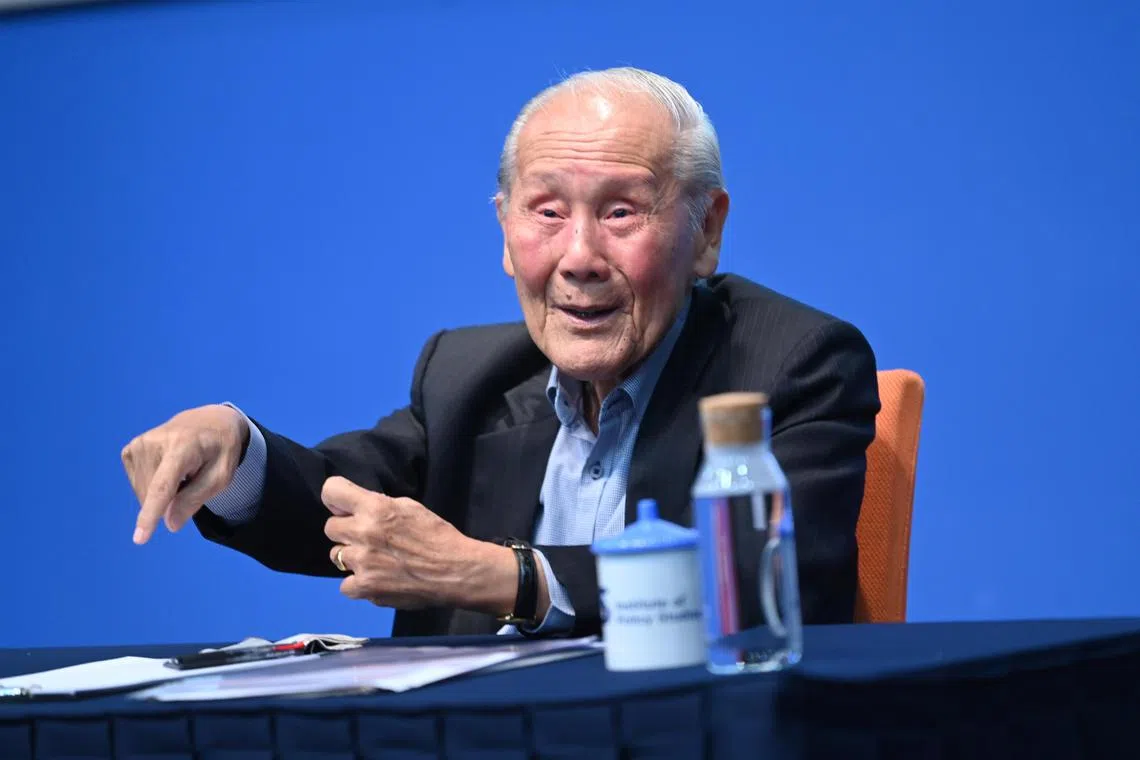Singapore’s response to China’s influence in Asean critical to regional peace: Historian Wang Gungwu
Sign up now: Get ST's newsletters delivered to your inbox

Prof Wang Gungwu speaking at the Institute of Policy Studies’ IPS-Nathan lecture series, “Living With Civilisations: Reflections On South-east Asia’s Local And National Cultures”, on March 8 at NUS.
PHOTO: INSTITUTE OF POLICY STUDIES/JACKY HO
SINGAPORE – Singapore is committed to the idea that its citizens, of whatever origin, should respond only to borderless civilisational appeals and not to nationalist ones, said Professor Wang Gungwu.
Speaking on the topic of China’s influence in Asean and how Singapore should position itself, the eminent historian said Singapore’s modern culture would require its leaders to try their hardest to keep the national and the civilisational clearly differentiated.
It is also in the Republic’s interest to support the common aspirations of all member states of the region, he added.
“Its most important contribution is to ensure that Singaporeans of Chinese origin would be able to act in ways that the whole Asean community can understand and be comfortable with,” Prof Wang said. “That would show how a modern nation-state could, as with cultures in the past, co-exist with a variety of living civilisations.”
Prof Wang was speaking at the Institute of Policy Studies’ IPS-Nathan series, “Living With Civilisations: Reflections On South-east Asia’s Local And National Cultures”, on Wednesday at the National University of Singapore (NUS). The 93-year-old has been University Professor at NUS since 2007, and Emeritus Professor at the Australian National University since 1988. He was also director of NUS’ East Asian Institute from 1997 to 2007.
Nobody foresaw the swift rise of China and its turn towards a state-centred capitalism that provided it with the economic power to make it appear as a threat to the United States, Prof Wang said.
He added that China’s success in using the developed world’s free market economy to reach out to the developing world has made its modern claims more credible than anyone thought were possible.
Equally surprising has been the American response. The politically polarised nation has called for an aggressive nationalism against China, a call that seems to have been the only one that can unite the country, Prof Wang said.
In response, China has revived the nationalism that had enabled its people to resist Japanese invasions a century earlier, he said.
“What is new is that both the PRC (People’s Republic of China) and the US now see themselves as representatives of progressive civilisations,” he said. “I cannot predict the outcome of that dangerous rivalry.”
Elaborating on the history of Asean, he said that at the end of the Cold War, all 10 states came together as an enlarged Asean and learnt to deal with the globalised world as a regional association.
However, their ties with other civilisations are retained largely through their mix of peoples, who remain proud of their respective civilisations and help to keep their plural societies alive.
Where Singapore in South-east Asia is concerned, he said: “I am one of many who have been concerned as to what those of Chinese origins might do when the PRC calls on them as Chinese to sympathise with its aspirations for the future. Needless to say, there will also be repercussions in other Asean states.”
Besides Singapore, no other state has a majority whose populace might be expected to provide a singular response to this inescapable dilemma, he added. All Asean member states will closely observe how Singapore resolves this conundrum.
“If Singapore can... show how that response conforms to South-east Asian experiences, it should strengthen the region’s confidence in responding to its relations with other civilisations,” he said.
On the region, Prof Wang added: ”If it can hold firm as a united Asean that co-exists with living civilisations, that might help to prevent our peace-seeking multi-civilisational world from descending into the warring nationalist cultures that threaten all of us today.”


